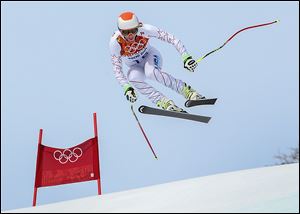
Austria’s Mayer trumps U.S.’s Miller
Victory marks huge upset in men's downhill event
2/9/2014
United States' Bode Miller jumps during the men's downhill at the Sochi 2014 Winter Olympics, Sunday, Feb. 9, 2014, in Krasnaya Polyana, Russia.(AP Photo/Luca Bruno)
SOCHI, Russia — Matthias Mayer shut his eyes for a moment, his day's work over.
If he had trouble believing what had just happened as he stood before the crowd it was with good reason. The Austrian struck a big upset Sunday in one of the Olympics' marquee events, capturing the men's downhill and upending the elite of his sport.
"It's amazing to be an Olympic champion," he said.
Mayer has never finished better than fifth in a World Cup downhill. That proved no obstacle in dismissing the preordained favorites — Aksel Lund Svindal of Norway finished fourth and Bode Miller of the U.S. eighth.
In a country where skiing is revered, Mayer gave Austria a jolt.
A few weeks ago he was not even considered the nation's best shot for gold.
He covered the Rosa Khutor course in 2:06.23 and beat Italy's Christof Innerhofer by 0.06 seconds. Norway's Kjetil Jansrud won the bronze.
Miller, who dominated the training runs, was so unnerved by the change of visibility he thought he'd have "to do something magical to win."
That was left to Mayer, who enjoys good skiing bloodlines — his father, Helmut, won a super-G silver medal at the 1988 Calgary Games.
SPEEDSKATING: Another royal visit, more Dutch gold. Irene Wust gave the Netherlands its second victory by winning the 3,000.
Skating before her king and queen, Wust won in 4:00.34. Defending champ Martina Sablikova of the Czech Republic took the silver while Olga Graf won bronze for Russia's first medal of the games.
Claudia Pechstein, 41 and a six-time Olympian, was fourth.
Wust, her nails red, white and blue like the Dutch flag, held up three fingers, signifying her third Olympic gold medal.
CROSS-COUNTRY: Switzerland's Dario Cologna had ankle surgery in November, but that now seems ancient.
He won the 30-kilometer skiathlon, pulling away at the top of the last uphill section.
The three-time overall World Cup winner claimed his second Olympic gold medal. He was timed in 1:08:15.4.
Defending champion Marcus Hellner of Sweden took silver, with the bronze to Norway's Martin Johnsrud Sundby.
Biathlon: Slovakia's Anastasiya Kuzmina matched her gold from Vancouver in the women's 7.5-kilometer sprint.
Kuzmina shot flawlessly and finished in 21:06.8. The silver medal went to Russia's Olga Vilukhina and the bronze to Ukraine's Vita Semerenko.
Kuzmina's brother is Russian biathlete Anton Shipulin, who was fourth Saturday.
LUGE: Felix Loch, still only 24, did it again. The German luger won his second straight Olympic gold medal, leaving the rest of the field in his icy wake.
Loch completed four runs down the Sanki Sliding Center track in 3:27.562 — 0.476 seconds ahead of Russia's Albert Demchenko, who won the silver in his seventh Olympics. Italy's Armin Zoeggeler won the bronze, giving him a record six medals in six games.
SKI JUMPING: In control from the start, Kamil Stoch of Poland won the Olympic gold in the men's normal hill individual ski jump.
Stoch had the best jump in each round, putting first ahead of the silver medalist Peter Prevc of Slovenia and bronze medalist Anders Bardal of Norway.
Simon Amman of Switzerland, the defending champion from Vancouver who was seeking a record fifth Olympic gold medal, finished 17th.
WOMEN’S HOCKEY: Olga Sisina's shot deflected off a defender and into the net, and Yekaterina Smolentseva scored on a 2-on-1 just 38 seconds later to help Russia overcome an early deficit and beat Germany 4-1.
Yulia Leskina made 14 saves for Russia. Viona Harrer stopped 33 shots for Germany.
Jenni Asserholt deflected a shot into the net for a first-period goal and Sweden held on to beat Japan 1-0.
Valentina Wallner stopped 19 shots for the Swedes.
Nana Fujimoto made 22 saves for Japan, which had not qualified for the Olympics in women's hockey since the sport was added to the Winter Games in Nagano in 1998.
The Swedes have struggled lately, falling into the second-tier Group B that will have to compete for two spots in the quarterfinals.